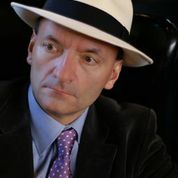by Mike Telin

I caught up with Stephen Hough by telephone, and we began by talking about his recent recording of the Dvořák and Schumann concertos with Andris Nelsons and The City of Birmingham Symphony Orchestra, which will be released by Hyperion Records on April 8.
Mike Telin: Congratulations on the new CD — it’s wonderful. I must say that when I first heard about the recording I thought: the Dvořák concerto, now that’s an interesting choice.
Stephen Hough: I know, Dvořák is an amazing composer and yet so many people say, ‘Oh, I don’t think I’ve ever heard it,’ or ‘I didn’t know Dvořák wrote a piano concerto.’ It feels amazing to be in the 21st century playing what can sometimes be a premiere by someone as famous as Dvořák.
MT: I’ve now listened to the recording three times, and I have to say that the piece is growing on me.
SH: I love it, but it sort of divides people. There are some musicians who absolutely love it. I’m thinking of András Schiff and also Iván Fischer of the Budapest Festival Orchestra. Both of them really consider it to be one of the great piano concertos. Then there are others who have said to me, ‘Oh, I hate that piece.’
It is not a piece that automatically comes off in performance. It needs a lot of love, a lot of care, and a lot of time to learn the notes. I must say, there were a number of times when I was learning it that I wondered whether it was really worth it — should I carry on?
MT: How long did it take you to learn it?
SH: I would say probably a good year. Because I’m traveling so much, I don’t have a lot of extra time. Of course Sviatoslav Richter famously talked about taking two years to learn the Dvořák but only three months to learn the Bartók second. That seems extraordinary, but I can understand because nothing in the Dvořák lies in the right place on the piano. Everything is awkward. It’s awkward to project it and it’s awkward just to get your fingers around the notes.
MT: You wrote on your blog that it is a “Concerto for ten thumbs.” When you say that it doesn’t lie well, can you give an example?
SH: In the first movement, the main second subject is in B-flat major. The orchestra plays that subject with a wonderful light airy touch, and then the piano plays the theme. The right hand is fine, but Dvořák gives the left hand an arpeggio that is one of the most awkward things ever written for the keyboard. Liszt never wrote anything as awkward as that. It’s a bit like driving a car with a trunk full of lead bars. It simply won’t move. It will not go fast. And so many moments in the concerto have the lead bars in the trunk and you have to work a way around them, which takes months. I must have spent hundreds of hours on that little passage, not only getting the notes but also getting the right sound, that airiness, that transparency that will make it graceful rather than like I’m wearing a pair of boots to walk in the snow.
There are a hundred other examples — like the very opening, when the piano comes in with a passage in double thirds in both hands. It’s just ferociously awkward to start the piece like that because it doesn’t sound difficult, and that’s the other downside. You play Liszt and it sounds very difficult, but it’s not because it lies so well under the hands.
MT: At the conclusion of your Telegraph blog about the concerto, there is a great line: “I think the pianist needs to be able to say, at least during the concert itself: ‘This is probably my favourite piano concerto.’”
SH: That line is actually from a friend of mine. But I think when you are onstage you really have to believe in what you are playing, that it is the greatest thing that’s ever been written. You can’t ever go on and think, ‘Well, I’m playing a second-rate piece’ because it will sound second-rate. It’s the same with an actor in a play. You’re not always performing Shakespeare, but you have to believe one hundred percent in what you are performing for it to work. Everything is life or death when you’re onstage.
MT: With all of the hurdles to overcome, and as busy as you are, why did you decide to take on the concerto?
SH: I think it’s because I did fall in love with it. And because it’s not played so much, I thought it would be an interesting piece to record. I was working with a conductor who said to me, “I’ve never heard this piece work,” and I thought that was an interesting challenge — could I make this piece work? What is it about certain recordings that doesn’t work, particularly the very famous one with Richter and Carlos Kleiber, two amazing musicians who both talked about not liking it themselves. I thought there had to be a way that I could make people love this piece, so that’s what I aimed to do.
MT: I enjoy reading your blog very much, but I didn’t realize that you were the winner of The Sixth International Poetry Competition.
SH: The poetry that I’m interested in expressing goes beyond the obvious really. It’s taking the everyday — the sounds, the air — and wondering how that can touch people deep inside. I’ve loved writing since I was a boy and I’ve always written a lot. I’ve just finished a novel, actually just this week. It’s something that I’ve been working on over the last year.
Published on ClevelandClassical.com February 29, 2016.
Click here for a printable copy of this article



